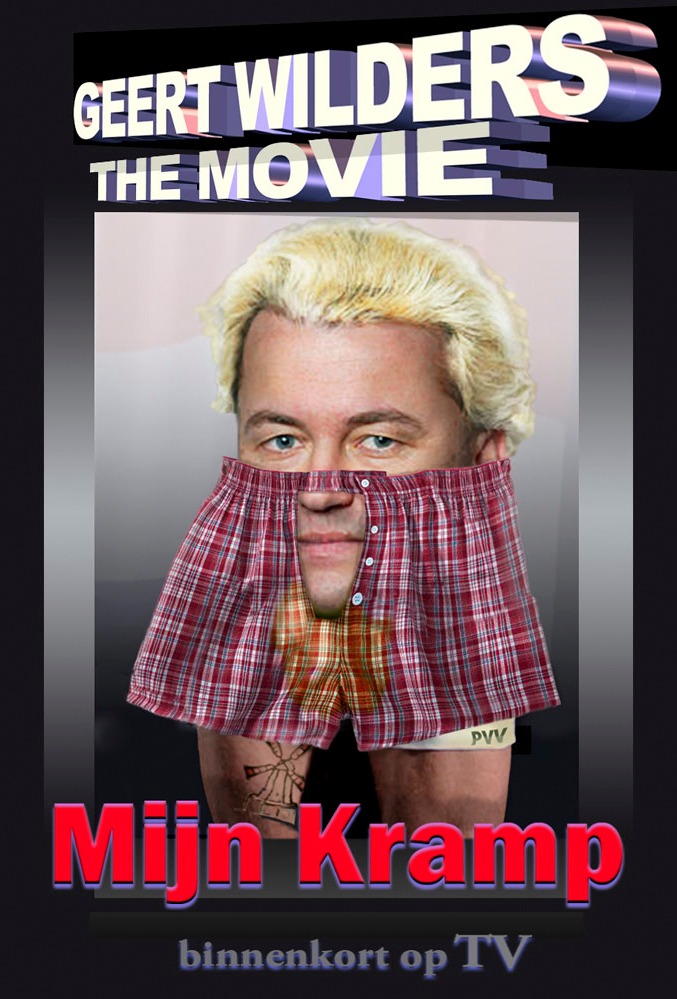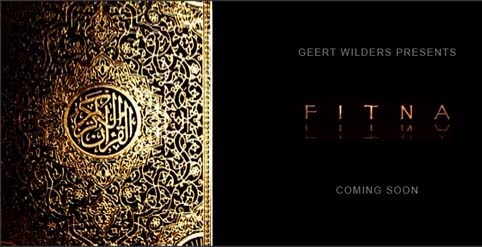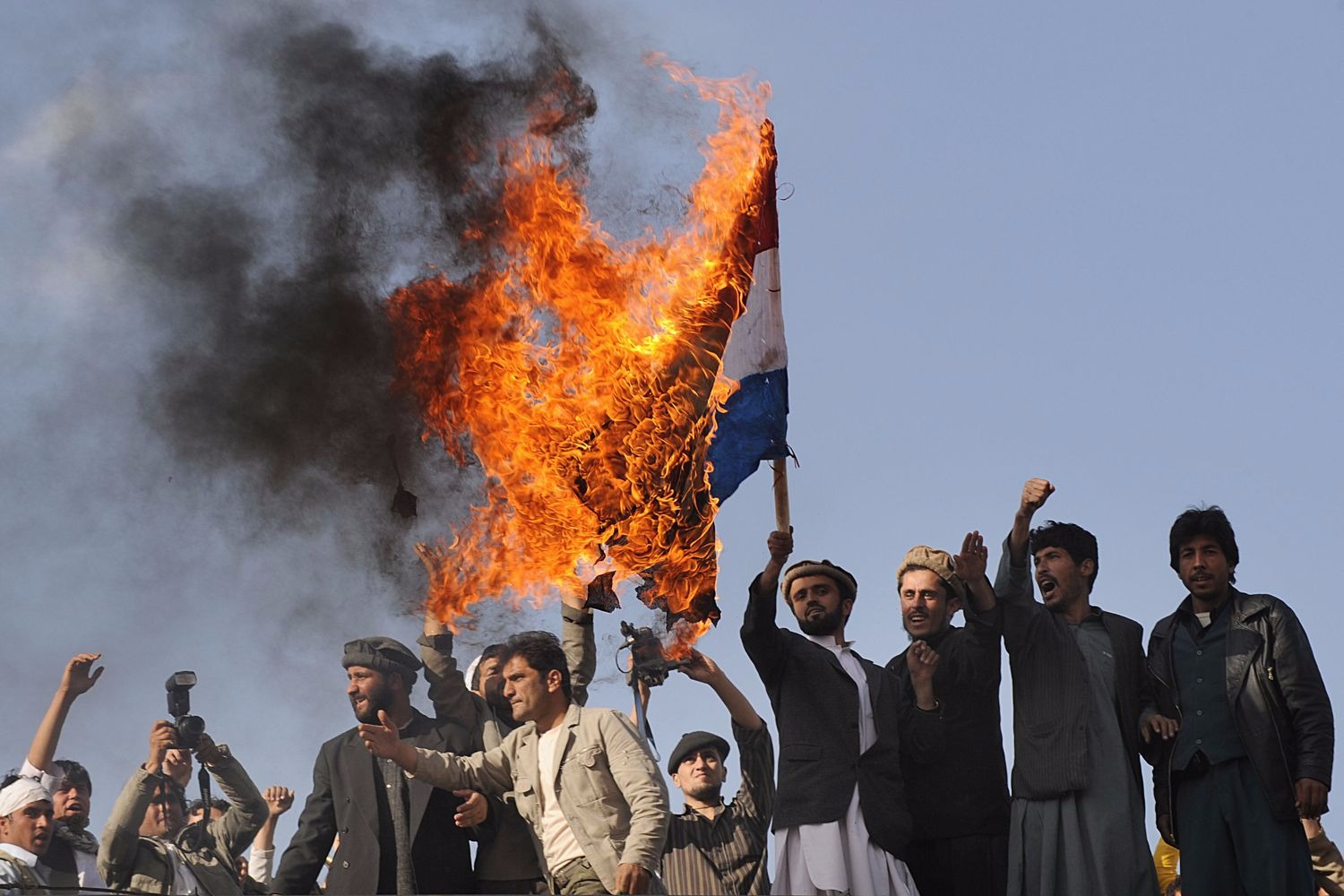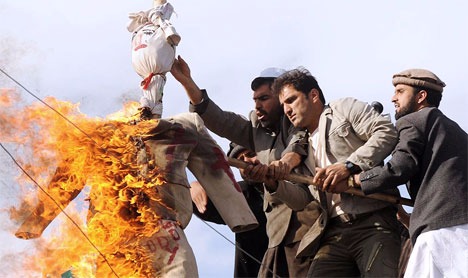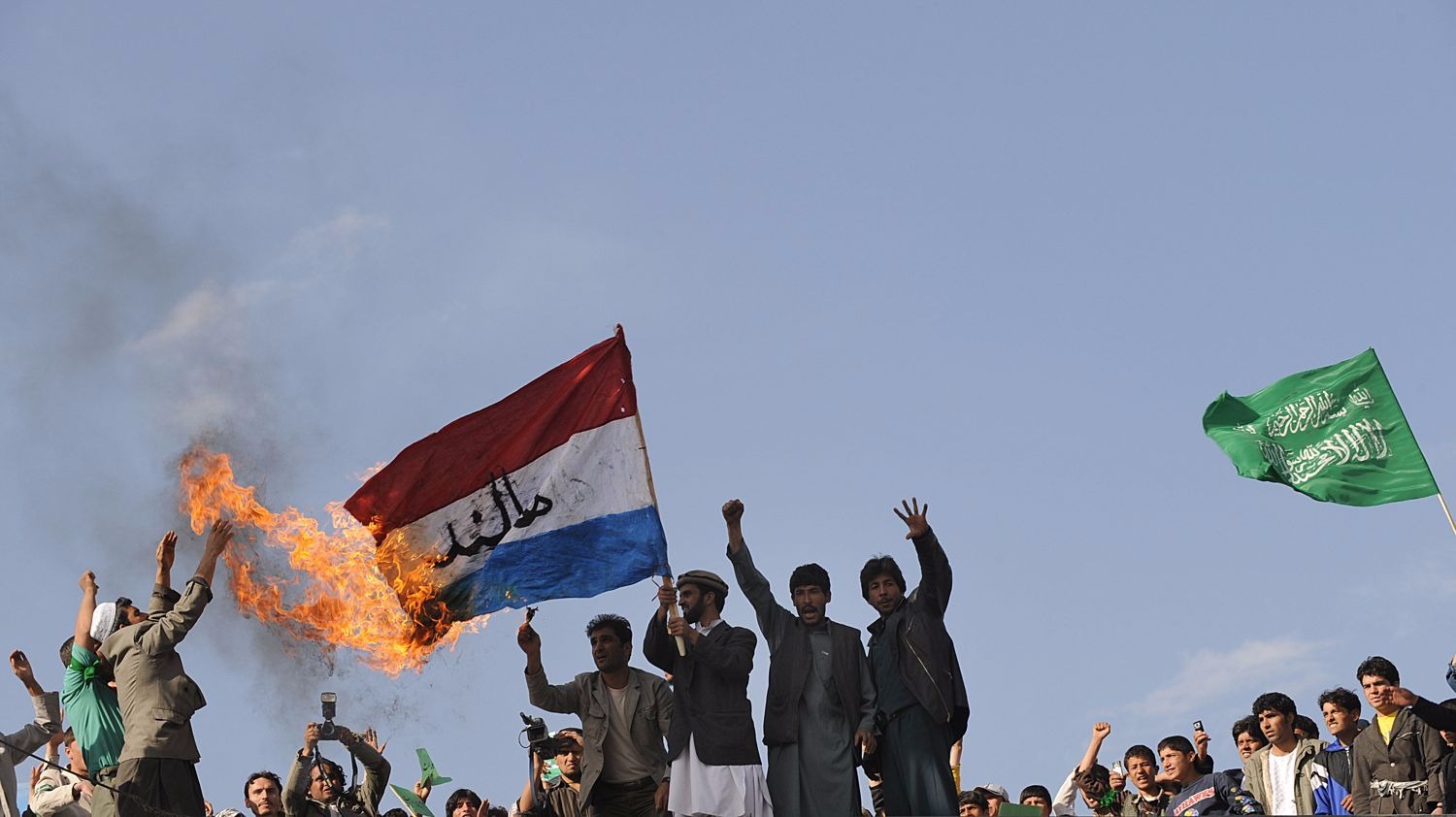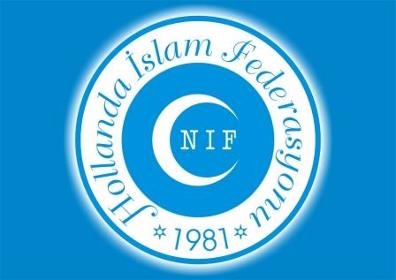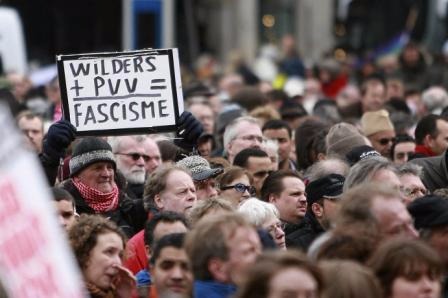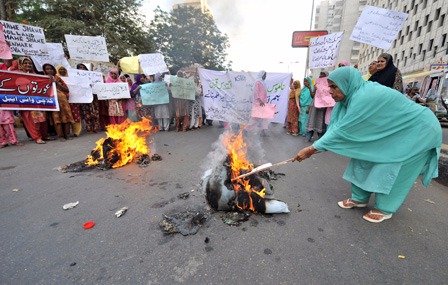Peculiarities of Cyberspace
Virtual community | Not a second-hand world | Networks of the future | Quantity creates quality | Community | Face-to-face or CMC? | P2P: networks of unknown friends | Flash Mobs | Second Life | Online morality and decency
Hypertextual Revolution | The future of the semantic web
Communicating on internet | E-mail: use & abuse of electronic messages
Anthropology of the Internet A stateless society? | Simple questions
Internet Use(rs) Cybergeography | International | U.S.A. | Europe | Netherlands | Closing digital divides
Cyber Capitalism A land without scarcity | Liberty or Equality in Cyberspace | Internet Shake-out? | Search Engines | Providers | A new colonial war?
Learning at Distance Educational revolution | Learning in your own time | Learning & teaching styles | Net-Students learn better | Learning without frontiers | Telecoaching
NetLove & Cybersex Intimate at a distance | Bodiless intimacy | Eroticizing virtual reality | Virtual & local relations | Netlove | Pornography in Cyberspace | Child Pornography | Regulation of Cyberporno | CyberStalking
Politics Egypt: Facebook Revolution?
Cyberterrorism Jihad in the Netherlands | Jihadists running Wild(ers)
Death & Mourning Immortal in the web | Virtual graveyard | Virtual mourning groups
Geert Wilders’ film
There were terrorist attacks on the American Twin Towers, metro bombs in Madrid and London, and there was the horrifying murder of Theo van Gogh. And people were killed, just like in all the other attacks committed by jihadists, by terrorists inspired by the islam. What makes these acts of violence extra shocking was that they weren’t committed by muslim fighters from far-away countries, but by – on the face of it – integrated and often well-educated young western muslims and converts. The publication of the Danish cartoons, in which the jihadists were ridiculed, led to a world-wide uproar, in which people were killed as well. Now it turns out that even a not yet broadcast film can lead to violent national and international uproar. Vicious fights, spiteful remarks and threats about a film nobody knew. How could this happen?
|
Can Geert Wilders take a joke?
|
|---|
Geert Wilders’ film is called Fitna, meaning ordeal or evil. Originally the concept literally meant heating gold and silver in fire, to test their authenticity. But in the Koran this word is used to specify the danger that muslims return to polytheism or heathenism. Someone who sows fitna is, in the eyes of muslims, a greater evil than a murderer. The damage seems to have been done even before Wilders brought it up in his little film.
Muslims from home and abroad stumbled over each other’s pens to condemn Wilders’ film. A multitude of critical revierers judged something that they had never even seen. If their indignation and threats hadn’t been so serious, one could have a good laugh. But perhaps we have to conclude in retrospect that we saw Wilders’ film a long time ago. Fitna is a compilation of visual material that we saw a lot earlier: videos of armed-to-the-teeth terrorists slaughtering helpless citizens.
It also goes without saying what the construction and focus of the film is because it is such an old and unfortunately effective recipe. Step 1: reduce the islam as a religion to the spiteful political ideology of the jihadists, who commit an attack while referring to the Koran. Step 2: generalise this jihadist image of the ‘true islam’ to such an extent that the Koran emerges as a merely hatred sowing and violence inciting book. Step 3: subsequently, conclude that the threatening ‘islamisation’ of society should, amongst others, be combated by forbidding the Koran (also in the mosques and at home) and by stopping the building of mosques. With such a muscled generalisation all muslims are put in the same jihadist category. Each muslim harbours Mohammed Bouyeri’s poison.
Wilders’ doctrine is: “The islam is a political ideology, striving for world dominion and threatening the West. .... The supreme good of islamic ideology is to destroy what is most precious to us: our freedom. ... Fitna is the last warning for the West [Wilders, Volkskrant 22.3.08]. The believes it is even “highly dangerous’ to talk about the islam as a religion. Wilders says he is not getting at muslims, but at the islam. He who doesn’t understand the (hysterical) logic of it, can try to understand Bert Wagendorp’s summary of Wilders viewpoint: “I hate Ajax, but I have nothing against its players, football is no sport and Zomerhitte (Summer heat) is the last warning before all glaciers melt” [Volkskrant 25.3.08].
With good arguments one can fight the viewpoints of islamically inspired extremists. But to Geert Wilders this merely seems to be a means to reach something completely different: sowing fear of and cultivating hatred against a certain religion (and its worshippers). Wilders wants to make us believe that essentially each muslim is violent and dangerous. The overwhelming majority of the muslims in the Netherlands pursues the same basic values as all other citizens: living in peace, freedom and prosperity.
Fuss about Fitna
In August 2007 Wilders compares the Koran to Mein Kampf and advocates a ban on the holy book for muslims. On 28 November 2007 the news gets out, by means of a leaked out message in the newspaper de Telegraaf, that Wilders wants to make a film about the Koran. The film would have a ‘Submission-like’ style: scriptures from the Koran would be filmed in an expressive way.
On 30 November Wilders writes in his weblog that with this film he wants to show that the Koran is not a mouldy old book, but still is “the reason of and source of inspiration for intolerance, murder and terror.”
In an interview in the Telegraaf of 26 January 2008 Wilders gives a further explanation: his film is not only about the Koran, but also takes place in the Koran. “The edges of the book will be visible all the time, and inside pictures are shown of what is described in the Koran scriptures.” In the opening shot the cover of the Koran can be seen on the left side, with to its right the text: “warning: this book contains shocking pictures.” After this opening shot the book opens, and one can see in particular existing pictures of other sources.
One doesn’t need to be a prophet to predict that bloody shots will be presented of muslims committing violent acts with a plea of their belief: stoning in Iran, a decapitation in Iraq, a suicide attack in Afghanistan, the burning Twin Towers in New York, the mutilated body of Theo van Gogh in Amsterdam. These are all shocking pictures. And Wilders anticipates this impact: “Those who find this shocking shouldn’t be angry with me, but with the people who have done these things. We take a ride along the various suras and verses and we look for an accompanying example.”
This is how Geert Wilders announced his Koran film on the internet. On the left side a picture of the front of the Koran can be seen, showing the Arabic text Allahu Akhbar, meaning ‘God is the Greatest’.
However, on 22 March 2008 the provider takes the site off the air. The message of Network Solutions was concise. “This site has been suspended while Network Solutions is investigating whether the site’s content is in violation of the Network Solutions Acceptable Use Policy. Network Solutions has received a number of complaints regarding this site that are under investigation.” The provider had received many hundreds of complaints about the site and was afraid of reputation damage. Besides, more than once Wilders had refused to inform the provider of the exact contents of the film. Network Solutions concluded that the contents would most probably be incompatible with their house regulations. Finally, Network Solutions was worried about the payment of the site. Not only the expected number of visitors, but also the number of cyber jihadists, ready to remove the Fitna site from the internet (or to block access to it), would lead to incredibly high costs. The provider received no certainty from Wilders that he would be willing to or could pay these enormous costs.
By blocking the Fitna site Network Solutions (NS) was immediately severely criticised by angry clients, who ended their contract with the provider. Various well-known (and a lot of internet traffic generating) webloggers terminated their contract with NS. Besides, the provider was accused of applying double standards. For one thing refusing to host Wilders’ film, for another doing registration services to the domain hizbollah.org. Yet, NS took this last criticism to heart and removed this domain.
The offer of the Nederlandse Moslim Omroep (NMO - Dutch Broadcasting Corporation) to show Fitna on television was rejected by Wilders. The NMO wanted to show the film on TV and organise a discussion between proponents and opponents after it was broadcast. The NMO’s condition was that they could see the film in advance, to be sure that it contained no punishable statements. “No way, NMO”, Wilders said. Abdelmajid Khairoun, president of the Nederlandse Moslim Raad (Dutch Muslim Board, the licence-holder of the NMO) expressed that his invitation to broadcast the film should be seen as a sign that “in these difficult times” muslims are open to reconciliation and dialogue. According to him the taboo of the film should be broken. “Broadcasting by the NMO allows our target group to get used to it” [source: NRC - 23.3.08].
Network Solutions
Network Solutions (NS) sells domain names and supplies related services such as website hosting and e-mail services to consumers, companies and organisations. NS was established in 1979. The company has changed of ownership a number of times. After it had been acquired by VeriSign in 2000 it was sold to the investment company Pivotal Group for $ 100 million in 2003. Pivotal sold NS to General Atlantic, a private share company specialised in internet technological companies. They probably bought it for some $ 800 million.
Foreign protests: bring us Wilders’ throat
Long before anyone has seen Wilders’ film the protests are raised. In the following chronicle we summarise the major protests from abroad.
- 21.1.08 – The Iranian member of parliament, Alaeddin Boroujerdi, warns the Dutch government about Wilders’ anti-islam film. If the Dutch government doesn’t prevent the broadcasting the Iranian parliament will summon the Iranian government to reconsider its relations with the Netherlands. Boroujerdi is chairman of the parliamentary committee for National Safety and Foreign Policy [source: IRNA – Iranian press agency].
- 28.1.08 – In the Al-Qaeda related web forum Al-Ekhlaas an urgent appeal is made to end Geert Wilders’ life. Wilders, the leader of the Partij voor de Vrijheid (Party for Freedom, PVV) should be ‘slaughtered’, because he insults the islam and the prophet Mohammed. Although the film hadn’t been broadcast or seen by anybody, the sentence of death is pronounced in the name of Allah.
- “In the name of Allah, we ask you to bring us the neck of this unbeliever who insults Islam and the Muslims and ridicules the prophet Mohammed.”
- For muslims it would be a religious duty and islamic honour to execute this verdict. In this context Mohammed B. – Theo van Gogh’s murderer – is presented as the exemplary muslim. He is honoured as a hero and his portrait is beside the article. There is also a call to ‘terrorise’ the Netherlands in order to prevent the broadcasting of the controversial film.
- “We, the muslims of the world, have to fight everyone who mocks the islam. The Dutch don’t want muslims in their country, because they are afraid to be destroyed by the islam.”
- The web forum on which these threats are published should be taken fairly seriously. Al-Ekhlaas.net is one of the most popular and influential jihadist web forums. Al-Ekhlaas functions as a primary source of information, propaganda, and training to jihadists in the whole World. It has strong ties with Al-Qaida in Saudi-Arabia. The site operates as a connection point to jihadist groups in the world. It is a clandestine meeting place for Al-Qaida in Afghanistan and the jihadists in Saudi-Arabia, Iraq and elsewhere. In this forum jihadists can ask the executive strategists of Al-Qaida questions about ideological and operational matters. Al-Ekhlaas more and more functions as the virtual centre for the coordination of activities, campaigns and attacks. Ample attention is paid to fighters who die in their operations – they receive the highest honour [see for more information: Cyberjihad Internationaal].
- 15.2.08 The Iranian minister of Justice, Gholam-Hossein Elham, writes a letter to his Dutch colleague Ernst Hirsch Ballin, requesting him to forbid the ‘insulting’ film on the Koran. According to Elham the European Convention on Human Rights offers the possibility to stop this satanic movement. The Iranian minister writes that Iran respects freedom of speech, but that insulting sacred and ethical values is completely unacceptable. Wilders’ ‘satanic’ film could lead to social unrest and violate the rights of the whole muslim world. Therefore the ‘blasphemous’ production should be stopped.
- 18.2.08 Hundreds of Iranian members of parliament urge president Mahmoud Ahmadinejad to reconsider his diplomatic and economic ties with the Netherlands and Denmark, because in these countries islamic sanctities are insulted in various media and they have presented a distorted view. The statement, signed by 215 of the 290 members of parliament, is broadcast on the Iranian state radio. The insults aimed at the islam would have been expressed under the influence of ‘presumptuous zionists’ [source: : NovaTV]. In the Palestinian Gaza Strip there was an immediate response to the appeal. A spokesman of the People’s Resistance Committees, an umbrella group of militant factions, summons muslims to blow up the Danish embassy and kill ambassadors. After this his audience set fire to a Danish flag.
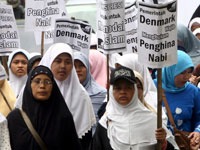 Muslims in Jakarta protesting against Wilders’ film
Muslims in Jakarta protesting against Wilders’ film
- 20.2.08 – The first foreign demonstration against ‘film maker’ Wilders takes place in Indonesia, in size of population the biggest islamic country in the world. Two hundred mainly female demonstrators protest in front of the Dutch and Danish embassy in Jakarta against Geert Wilders and the Danish cartoons. The demonstrators demand that the blasphemers are punished. According to them freedom of speech in Europe is abused in order to insult the islam. With their protest they want to prevent Wilders’ Koran film from being broadcast and the Danish cartoons from being republished. On their protest boards the demonstrators express their anger: “Death penalty for insulting prophet” and “Respond to islamic libel with Jihad.” A spokesman of the political muslim organisation Hizb ut Tahrir cries out: “Why does the Netherlands let these insults pass without punishment? They insult the islam under the guise of freedom of speech. But there are limits. No one has the right to discredit our prophet. The Netherlands should forbid the planned film of this controversial member of parliament.”
As early as December 2007 young members of the radical islamic movement Hizb ut Tahrir distributed pamphlets directed against Wilders’ film in several towns (without naming it). In the pamphlet muslims are summoned to defend the Koran, mainly against “certain persons in the Netherlands who are determined to make a film about the Noble Koran” and “not to silently watch the mocking of our religion and our Noble Koran.” The youngsters hope that “the muslims will move as individuals and in groups to honour Allah’s symbols and to defend their religion.”
- 25.2.08 – The Pakistani government demands from all internet providers in the country that the video website YouTube is blocked. The reason for this blockade is Wilders’ Koran film, yet to be broadcast. This way the Pakistani Telecommunication Authority (PTA) wants to prevent that (fake) trailers of Wilders’ Koran film can be watched by Pakistanis via YouTube.
- 28.2.08 – The Taliban threaten to increase their attacks on Dutch troops in Afghanistan if the anti-islam film of Geert Wilders is broadcast. The spokesman of the Taliban, Zabihullah Mujahid, calls the film ‘an insult to the islam.’ “We in Afghanistan will increase the attacks against Dutch troops if the film is broadcast.” The Taliban will summon the United Nations to stop activities such as Wilders’ film in order to prevent a schism between the islam and the rest of the world. The Taliban considers the planned film and republication of the cartoon as part of a ‘crusader war’ against the islam. During the cartoon riots in 2006 11 people were killed during demonstrations in Afghanistan. In the islam republic of Afghanistan people can be sentenced to death for criticism on the prophet Mohammed and the Koran.
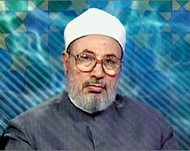 Yusef Al-Qardawi
Yusef Al-Qardawi
- 29.2.08 – During his Friday sermon sheik Yusuf al-Qaradawi, star preacher of the Arabic channel Al Jazeera, summons to boycott countries that attack the islam. “It is absolutely forbidden to give them money that you earn. With this money drawings and pictures are made in which our prophet is insulted.” The Egyptian sheik is one of the most influential islamic scholars and has written more than 50 books. He is president of the International Union of Muslim Scholars (IUMS). He is considered to be a moderate conservative who tries to adapt the ideals of the islamic way of living to those of modern society. But he rejects the universal rights of man and a few fundamentals of democracy. After the attacks of 11 September he summoned muslims to donate blood for the victims of the attacks and condemned terrorist violence. During the cartoon riots he called for a ‘day of anger’, but also in this case he condemned violent actions. Using suicide attacks against hostile armed forces is only legitimate when the defending warriors have no other ways of defending themselves.
- 5.3.08 – The three highest authorities in the sunnitic islam summon the international community in an official statement to denounce Wilders’ film. They ask the United Nations to adopt a law that prohibits insulting religions. The sunnitic priests are the liberal sheik Mohammed Sayyid Tantawi (Al Azhar University in Caïro), Mahmoud Hamdi Zaqzouq (minister of religious affairs of Egypt) and Ali Joum’a (great mufti of Egypt). In their statement they point out to the Dutch and Danish governments that they shouldn’t confuse the freedom of speech with insulting the islam. “What the Dutch member of parliament intends: producing the film Fitnain which he describes the Koran as fascist, is a serious attack on the islamic relics.”
- 6.3.08 – The Iranian junior minister Mahdi Safari of Foreign Affairs summons the Dutch government once more to stop Geert Wilders’ film. According to Safari the film is “an insult to the 1.2 billion muslims and their values and norms.” In a conversation with the minister of foreign affairs Maxime Verhagen Safari suggests that the Dutch government might forbid the anti-Koran film of Wilders on the basis of the Universal Declaration of Human Rights. He refers to article 29, which says that the rights of an individual can be restrained to protect the rights and freedoms of others.
- 7.3.08 – In the Afghan capital Kabul about 200 politicians demonstrate outside parliament. They shout: “Death to the enemies of the islam.”
- 7.3.08 - In Iran the influential ayatollah Ahmad Khatamiranks the Netherlands, together with Germany and Denmark with ‘the enemies’ of Iran. Germany is included in the list of the blasphemous, because the German Minister of the Interior Wolfgang Schäuble (CDU) urged the European media to publish the Mohammed cartoons. In his prayer the ayatollah incites to “sign a joint petition, so that the islamic countries sever their ties with the insulting countries.”
- 8.3.08 – Protest march of approximately 5,000 to 10,000 people in Herat (Afghanistan). The demonstrators chant slogans such as “Holland dood” and “Death to Denmark,” burn the Danish and Dutch flags, and vent their fury on a police car. In the province of Kunar Afghans also assembled to demonstrate.
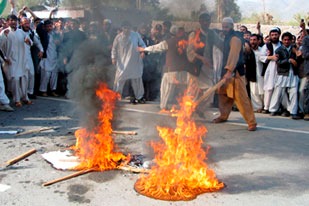 Demonstrators in Jalalabadburning Danish and Dutch flags
Demonstrators in Jalalabadburning Danish and Dutch flags
- 9.3.08 – Protest march of more than 2,000 people in the Afghan town Jalalabad. They demonstrate against the Danish cartoons of the prophet Mohammed and Geert Wilders’ film. They also chant “Death to Denmark, Death to Holland.” The demonstrators incite the Afghan government to sever the ties with the Netherlands and Denmark and to withdraw the troops that both countries have in Afghanistan. “We want our government to kick the Danish and Dutch troops out of our country. They have insulted our prophet and our faith”, a demonstrator argued [source: Volkskrant 9.3.08]. The demonstrators demand that the artist of the cartoons and Wilders are tried. A university student participating in the demonstration stated: “If our demands aren’t complied with we will organise more marches and avail ourselves of suicide attacks against the foreigners.”
- 12.3.08 – In Pakistan the police use truncheons and tear gas to suppress a protest of hundreds of students. The students wanted to protest against Wilders’ anti-Koran film and the Danish Mohammed cartoons. The demonstration was organised by the Jamaat-e-Islami party (JI). There were protests in various parts of Peshawar at the border of Afghanistan.
- 12.3.08 – Afghan NATO troops distance themselves from the Danish Mohammed cartoons and Wilders’ proclaimed Koran film. The Afghan troops ask the government in Kabul to sever their ties with Denmark and the Netherlands and to send their troops away. Prime minister Balkenende explains that he is ‘extremely angry’ about the demonstrations in Afghanistan. “This is really out of order. We are in Afghanistan to contribute to peace, justice and safety. I reject what is happening there.”
- 17.3.08 – In Teheran Fatmeh Mousavi of the ‘Headquarters of the True Bloggers’ incites a virtual jihad. Mousavi encouraged IT workers to hack blasphemous sites and weblogs and to shut them down. “Attack the impertinent institutions that insult the islamic community.” According to Mousavi virtual jihad is a religious duty that no muslim may withdraw from.
- 21.3.08 – Approximately 5,000 Afghans protest against the reprint of a cartoon of the prophet Mohammed in Danish newspapers and against Wilders’ Koran film. They cry out “Death to Denmark” and “Death to the Netherlands,” but also “Death to America” and “Death to the Jews.” The demonstrators gather near a mosque in the west of Kabul. They burn Danish and Dutch flags and a doll that impersonates Geert Wilders. The man addressing the crowd from a truck via a megaphone tells them that the Afghan government should send the Danish and Dutch troops home within two days and should close their embassies – “otherwise we will take action” [source: Reuters].
The Dutch flag and a doll impersonating Geert Wilders are ritually set fire to. It happened in Kabul (Afghanistan) on Good Friday 21 April 2008.
- 21.3.08 – The Egyptian
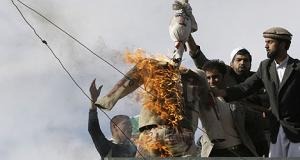 minister of Foreign Affairs, Hossam Zaki, regrets the unfounded attacks on the islam and states that Wilders’ plans to show his anti-Koran film are closely watched. “It is regrettable that European lawmakers and politicians use gratuitous methods to gain electoral votes by attacking the sacred values and religions of others.” These politicians “focus their hatred on Islam” and intend to show a film that undermines the islamic symbols. This type of actions “feed hatred against Muslims and encourage extremism and confrontation instead of opting for dialogue based on mutual respect” [source: france24].
minister of Foreign Affairs, Hossam Zaki, regrets the unfounded attacks on the islam and states that Wilders’ plans to show his anti-Koran film are closely watched. “It is regrettable that European lawmakers and politicians use gratuitous methods to gain electoral votes by attacking the sacred values and religions of others.” These politicians “focus their hatred on Islam” and intend to show a film that undermines the islamic symbols. This type of actions “feed hatred against Muslims and encourage extremism and confrontation instead of opting for dialogue based on mutual respect” [source: france24].
United Nations: islamic halving of human rights
Islamic countries exert themselves to put criticism on the islam out of action and if possible to forbid it. The Organization of the Islamic Conference (OIC) counts 57 countries and is the largest electing block within the UN. The OIC has been conducting a campaign against freedom of speech since 1999, because they consider it to be “a cover of the West to justify utterances against the islam” (secretary-general of OIC, Ekmeleddin Ihsanoglu).
|
“The OIC Group believes that the right to freedom of expression carries with it special duties and responsibilities, and does not provide a license to insult and hurt the sentiments and beliefs of others”
[OIC Statement on Islamophobia - 29.02.2008].
|
On 18 December 2007 a resolution was adopted in the Committee Human Rights of the UN, summoning governments to restrain freedom of speech. The resolution was proposed by Pakistan and accepted with a large majority. Of the voting countries the islamic and independent countries voted in favour of the resolution. All western countries voted against it. In the summary of the resolution against blasphemy we can read:
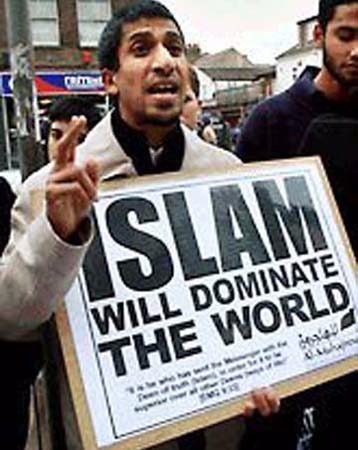 “draft resolution on Combating defamation of religions (document A/C.3/62/L.35) would have the Assembly express deep concern about the negative stereotyping of religions and manifestations of intolerance, as well as discrimination in matters of religion or belief in some regions of the world. It would further call upon the Assembly to note, with deep concern, the intensification of the campaign of defamation of religions, as well as the ethnic and religious profiling of Muslim minorities in the aftermath of the tragic events of 11 September 2001. The draft would also have the Assembly emphasize that everyone has the right to freedom of expression, which should be exercised with responsibility and may, therefore, be subject to limitations according to law which are necessary for respect of the rights or reputations of others, protection of national security or of public order, public health or morals, as well as respect for religions and beliefs” [bron].
“draft resolution on Combating defamation of religions (document A/C.3/62/L.35) would have the Assembly express deep concern about the negative stereotyping of religions and manifestations of intolerance, as well as discrimination in matters of religion or belief in some regions of the world. It would further call upon the Assembly to note, with deep concern, the intensification of the campaign of defamation of religions, as well as the ethnic and religious profiling of Muslim minorities in the aftermath of the tragic events of 11 September 2001. The draft would also have the Assembly emphasize that everyone has the right to freedom of expression, which should be exercised with responsibility and may, therefore, be subject to limitations according to law which are necessary for respect of the rights or reputations of others, protection of national security or of public order, public health or morals, as well as respect for religions and beliefs” [bron].
Although the resolution isn’t a binding guideline of the United Nations, it has meanwhile become a dominant line of thought. “Accepting the resolution is the last step in the direction of a more binding judgement of the United Nations General Assembly” [Peter Louter, Volkskrantblog - 21.01.08]. It is a macabre phenomenon: islamic countries that have never signed the Universal Declaration of the Rights of Man (because it was supposed to contravene the islamic doctrine), are now trying to justify the restriction of freedom of speech ensuing from the islam.
Domestic disturbances
In the Netherlands itself the islamic community mainly reacted with appropriate indignation to the announced Wilders’ film. Some protests were even fairly frivolous. On 23 January 2008 Marokko.nl and Academica Islamica organised a meeting with youngsters and at the end a symbolic cuddly bear was presented which was meant for Geert Wilders. “That man needs love and affection, which he lacked in his youth, so we want to compensate this” (Abdelhafid Bouzidi]. 3,000 People sent a hug to Geert Wilders on the website www.knuffelgeert.nl, especially created for this occation.
Most protests were more vicious and aimed at preventing the broadcasting of the Wilders’ film.
-
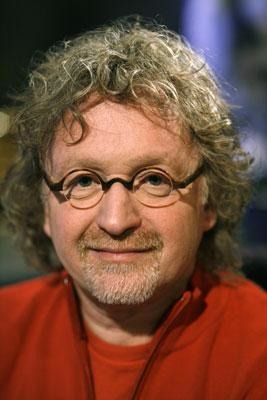 Harry de Winter
Harry de Winter - 17.3.08 – In a large advertisement on the front page of the Volkskrant programme maker Harry de Winter accuses Geert Wilders of racism. “If Wilders had said the same about Jews (and the Old Testament) as the load of crap he is telling about muslims (and the Koran) now, he would have long been written off and sentenced for anti-semitism.” The text was also supported by the ‘Stichting de Initiatieven’ and ‘Een Ander Joods Geluid’, of which De Winter is one of the founders. In an explanation De Winter compares Wilders’ position with the way in which the onset to the Holocaust was given in the thirties of last century. “Wilders argues that thé muslim should be tackled and that the Koran is a fascist book. That is also how once the persecution of the Jews began, by generalising matters.” His message is also aimed at the muslims, who shouldn’t let themselves be put in the same category. “The muslim community should declare itself more openly against terrorism” [Volkskrant 17.3.08].
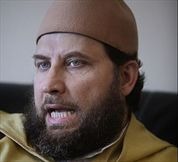 Imam Fawaz Jneid
Imam Fawaz Jneid
- 21.3.08 According to sheik Fawaz Jneid of the As Soennah mosque in The Hague there is a sinister conspiracy behind Geert Wilders. Behind Fitna is a preconceived plan to see to it that Western politicians implement anti-islam laws. By resolutely irritating and muslims and by provoking to violence, the basis for such laws would be established. The Danish cartoons of the prophet Mohammed were supposed to have the same goal. The sheik doesn’t explain who are pulling the strings behind the scenes. But an enormous danger is threatening: “If one is guided by the Dutch and European law then what Wilders, his party and his supporters say and do is pure discrimination and even more than that, it is fascist.” Jneid pins his hopes on the pressure that the large islamic countries will exert: “the islamic countries should definitely exert pressure on the Dutch government” [source: : Interview met Sheich Fawaz op Mzine TV]. It doesn’t become completely clear how Jneid’s concern for discrimination reconciles with his proposal to throw homosexuals off the roof of a block of flats. It also remained unclear how he reconciles the constitutionally embedded freedom of speech with his proposal to censor columnists, by establishing which words can and cannot be used in columns.
- 21.3.08 – The Nederlandse Islamitische Federatie (Dutch Islamic Federation, NIF) announces summary proceedings against Fitna the Movie. They wanted to enforce a preview, to let an independent expert determine whether the film is actually insulting to muslims. Should this be the case, the NIF wants to prohibit the screening of the film. The federation assumed that Wilders wouldn’t broadcast the film before summary proceedings were settled. “If Mr Wilders claims that his statements are legal, he can also wait till the law has confirmed this claim,” argues legal adviser E. Köse of the NIF [source: AD 21.3.08]. By this action the NIF defied the constitutionally embedded freedom of the press: what is published doesn’t have to be presented to anyone beforehand. Or, in the diction of article 7 of the Constitution: “Nobody needs prior permission to publish thoughts or feelings by means of the printing press” (and the same goes for radio or television programmes and for films). By its action the NIF seemed to foster the thought that some islamic organisations act as if the sharia has already been implemented in the Netherlands. Whether the film is insulting or discriminating is not determined by the government or by random ‘experts’ in a democratic state, but by the judges. The NIF not only demanded a prohibition of Fitna, but also the public apologies of the PVV-leader to the muslim population. According to the prosecutors Wilders has to publish a rectification on the front page of two national newspapers under penalty of 50.000 euro a day. In the rectification he has to declare that his statements on the islam, the Koran and the prophet are “incorrect and unnecessarily offensive.” The rectification has to end with an expression of regret [source: Telegraaf 27.3.08].
- 21.3.08 – Nine prominent figures from the south of Holland report against PVV-leader Geert Wilders. They think Wilders should be prosecuted for stirring up hatred against muslims. According to them the meanwhile deceased leader of the Centrumpartij, Hans Janmaat, was sentenced for much more lenient statements. The group included amongst others professor emeritus Theo van Boven, chairman Saadane of the Limburg Islamic Council and pastor At Ipenburg.In the report a number of controversial statements of Wilders are summed up, among other things Wilders’ proposition that the Koran would be the size of a comic paper if all resentful parts were taken out, and his statement that the Koran is the “Mein Kampf of religion.”
- 22.3.08 – Protest demonstration of over 1,300 people on the Dam Square in Amsterdam against “the intolerant and discriminating viewpoints” of the Partij voor de Vrijheid (Party for Freedom, PVV) of Geert Wilders. The demonstration was organised by the anti-racist organisation ‘Nederland Bekent Kleur’ (the Netherlands takes sides). People carried signs with slogans such as ‘Stop the muslim hunt’ and ‘No room for racism.’ According to Wilders the demonstration only showed that the Dutch population has turned her back to the multicultural society. He called the demonstration a ‘hatred-manifestation.’
Turn in the Oemmah.nl
The most striking phenomenon is the change in the attitude of Dutch muslims. In the past the muslim community in the Netherlands showed great reticence to declare themselves openly against islamically inspired terrorism. Too many muslims thought they had nothing to do with it and so they wouldn’t be called to account. Meanwhile they have learned that the negative image of muslims and the islam are particularly the consequence of the actions of jihadists who slaughter innocent citizens with an appeal to the Koran and threaten to kill politicians and writers. They have also learned that political strategy of Wilders and Verdonk is aimed at maintaining and exploiting this negative image of muslims. But the time of ‘victimship’ (of the attacks on the islam or on the jihadist form of it) and of sheer ‘complaining’ (of the actions of Pim Fortuyn, Ayaan Hirsi Ali, Theo van Gogh, Geert Wilders en Rita Verdonk) lies meanwhile in the past for many muslims. This offers opportunities to approach the misery of the islam in a more self-confident and assertive way.
Of course there were still muslims who tried to ‘justify’ themselves and avert ‘calamity’ via criminal law. It was attempted in several ways to prohibit showing Fitna. More than 45 organisations and individuals reported stirring up hatred and insulting. But there is also another side to it. Many other muslim and migrant organisations have made every effort in the Fitna-row to prevent further escalation. They summoned the Dutch muslims not to be provoked by Wilders & co and not to thoughtlessly express all emotions involved. Besides, they exerted themselves to provide the political and religious authorities in islamic countries with a realistic picture of the freedom of speech in the Netherlands and in particular of the freedom of religion for muslims.
|
Saying ‘sorry’ for Fitna
The ‘sorry for Fitna’-films put on YouTube are mostly of a surprising brevity, such as this one. But sometimes they are even very extensive statements, such as this fabulous speech by Ali. |
-
Representatives of the Contactorgaan Moslims en Overheid, the Protestantse Kerk Nederland and the Raad van Kerken (CMO - Contact Body Muslims and Government, Dutch Protestant Church and the Council of Churches) have an audience in Egypt with Muhammed Sayyed Tantawi. Sheik Tantawi is considered to be the highest religious authority of the sunnitic islam. He is the grand imam of the Al-Azhar mosque and rector of the islamic university of the same name in Cairo. CMO-chairman Dris el Boujoufi explains in the newspaper the Telegraafwhat the goal of his mission is.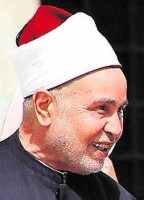 Mohammed Sayyed Tantawi
Mohammed Sayyed Tantawi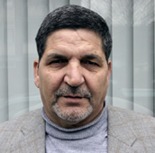 Dris El-Boujoufi
Dris El-Boujoufi- “First we are going to emphasise to sheik Tantawi in Egypt that the Netherlands is still a tolerant country, where muslims have a free rein to build mosques. And we also want to make clear that Wilders represents only a small segment of society.”
- The delegation wants to achieve that the relations between religions is not put under pressure and wants to prevent a boycott of Dutch products. After the publication of Fitnathe organisations intend to visit other religious leaders, for example the famous pastor Yusuf al-Qaradawi.
- On 11 February 2008 the Federatie van Islamitische Organisaties in Nederland (FION – Federation of Islamic Organisations in the Netherlands) sends a letter to sheik Yusuf al Qaradawi, the influential star preacher of Al Jazeera. In this letter the position of the Dutch government and people is extensively praised. Wilders is depicted as a politician who provokes muslims in order to polarise for his own electoral gain. FION asks Qaradawi to help realise a plan to clearly present ‘the truth of islam.’ For examply by a Koran match ((‘Holland International Award for the Holy Koran’). On behalf of FION Aissa Zanzen stated: “We have informed them about the situation of muslims in the Netherlands. We hope they will think along with us how to counter the criticism on the Koran and how to introduce others to the mercifulness of our prophet” [Trouw]. One month later FION sent tens of letters more to influential islamic politicians and religious leaders.
- Het Landelijk Beraad Marokkanen (LBM – National Council Moroccans) sent an ‘objective analysis’ of the Dutch situation round the Fitnafilm of Wilders to several islamic scholars, institutions and governments. In this report they argue elaborately in favour of a calm reaction to the film in the whole world. The remarkable starting point is that insulting the islam is a phenomenon inherent to globalisation. In this globalised, universal culture the islam has to search for a place of its own, even if the islam will not be taken for granted in the West. “Insulting the islam will therefore obtain a permanent character.” In the long run muslims have to enter into the debate about their religion and “look for cooperation with righteous, democratic and humanist partners in the West.” A straightforward, directive conclusion is drawn: “The Netherlands isn’t Denmark. Here muslims are full, active and responsible citizens. The Dutch society sticks together. Therefore de Koran film deserves another approach [source: Volkskrant 22.3.08].
On the day Wilders’ Koran film is released all Moroccan mosques open their doors widely. The open day is meant ‘to keep things together.’ Brahim Bourzik, spokesman of LBM, explains that LBN has a scenario, in case the film leads to great trouble. Apart from opening the mosques Moroccan organisations and other muslim and non-muslim organisations intend to organise a manifestation shortly after the release of Wilders’ film.
-
 FORUM, Institute for Multicultural Development, wrote a Fact Book with facts about the situation of Muslims in the Netherlands. They sent this book to the Organisation of the Islamic Conference (OIC) in Senegal. The reports in the foreign media on the broadcast of Fitna mostly lack facts on the living conditions of muslims in the Netherlands. In order to correct the false representation of the Netherlands FORUM presents a clear survey, with data about muslims and migrants in important domains of society. It contains numbers on among other things labour participation, freedom of religion, mosque building, islamic education and relevant legislation.
FORUM, Institute for Multicultural Development, wrote a Fact Book with facts about the situation of Muslims in the Netherlands. They sent this book to the Organisation of the Islamic Conference (OIC) in Senegal. The reports in the foreign media on the broadcast of Fitna mostly lack facts on the living conditions of muslims in the Netherlands. In order to correct the false representation of the Netherlands FORUM presents a clear survey, with data about muslims and migrants in important domains of society. It contains numbers on among other things labour participation, freedom of religion, mosque building, islamic education and relevant legislation.
|
Wilders is not the Netherlands
On the site wildersisnotholland.com thousands of people signed a statement, intending to show the world that Geert Wilders and his film Fitna do not reflect the ideas of all Dutch people. The petition was signed by more than 10,000 people (score 26 March). Over 7,000 people signed the petition ‘Wilders is not Holland’ on internet. Because the site is particularly intended to show foreign countries that many Dutch people do not share Wilders’viewpoints, it also has an English, French and Arabic version. Initiator and Llink-presenter Marcel van der Steen: “It isn’t an anti-Wilders site. Wilders has the right to his own opinion. If he wants to put it forward in a film, he should do this by all means” [source: Fok].
|
Premiere – a sigh of relief and boredom
Then came the day of the true premiere of Fitna. This took place on Thursday 27 March 2008. It took place on LiveLeak. LiveLeak (formerly Ogrish.com) is a kind of YouTube, but with even more horrifying films (such as the one of Saddam Houssain’s execution). LiveLeak shows what YouTube and Google Video don’t show: uncensored, violent images.
With respect to content and as expected Fitna has hardly anything new to offer. It is a sequence of well-known images and a collection of newspaper clippings about terrorist attacks, mingled with suggestive images, drawn from other contexts, that have nothing to do with terrorism. Also the construction is no surprise. First the islam is reduced to the jihadist doctrine. Subsequently images are used to make a reasonable case for this jihadist doctrine as a source of inspiration for terrorists. And finally this distorted image of the islam is generalised to the whole muslim community in the Netherlands. A community that has nothing to do with the violence of foreign jihadists that is shown in the film. In this way the islam and Dutch muslims are identified with the most atrocious murder and maiming practices. The most provoking parts are the animated Mohammed caricature with a turban bomb with a slowly burning fuse, and the ‘tearing up’ scene, in which is emphatically expressed that no page out of the Koran is torn up, but out of the phonebook. Wilders leaves it up to the muslims themselves to tear hate-stirring verses out of the Koran.
Although the whole construction of Fitna is based on a deliberate deception, no statutory laws are broken. Fitna is a boring, little original product. All shocking images are well-known to everyone. After so many weeks of waiting many people breathed a sigh of relief. Even in GeenStijl the conclusion is drawn that it is a “Most disappointing product. Much ado about nothing.” In his ardour to paste existing films, pictures and newspaper clippings, Wilders made several big blunders and violated copyrights. One of the most remarkable blunder is the one in the part showing the murder of Theo van Gogh, in which a picture is shown representing Mohammed Bouyeri. However, Wilders doesn’t present a picture of Mohammed Bouyeri, but of the Dutch-Moroccan rapper Salah Edin. This might be worth a trial. Wilders still thinks that every Moroccan with a beard is a dangerous terrorist. “It shows that Wilders sees every muslim as a Mohammed B.” [Salah Edin] Wilders didn’t only choose a wrong picture; his whole idea of the islam is biased, distorted and false.
Fitna adds fuel to the fear of islam and of muslims. This is done by comparing the islam with committing horrifying deeds. From a moral and political viewpoint this irresponsible terrifying is the main objection against Wilders’ film. Stimulating and cultivating fear of muslims (=islamophobia) is the starting point of a slide that always ends in fear of muslims.
Prime Minister Balkenende explained that the film had no other goal but “hurting feelings”. This is not the same as “inciting hatred.” The first is not punishable in the Netherlands, the second is. Wilders may not directly incite to hatred of muslims. But he does put all Dutch muslims in the witness box, as long as they don’t tear up verses from the islam that Wilders doesn’t approve of. The overwhelming majority of the Dutch muslims abhors terror and have nothing to do with the preachers of hatred that summon a jihad against the disbelievers. By putting fuel on this fear it is those muslims that Wilders offends. And precisely these muslims are the main allies in the battle for a reconciliation of the islam with the values of the democratic state.
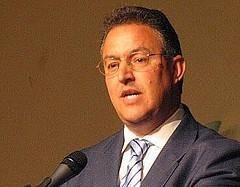 Ahmed Aboutaleb
|
|---|
Of course this doesn’t mean that muslims themselves have to think hard about the fear that many Dutch citizens have for the islam. State Secretary Ahmed Aboutaleb described it as follows: “Muslims have to think about the fear for their religion. The majority remains silent and that isn’t right. We have chosen for the Netherlands, especially because of the freedom here. This should be said openly. I miss the voice that disassociated from extremism” [Pauw & Witteman 27.3.08]. Earlier he wrote in the Volkskrant [14.3.08]: “The fact that there is so much hatred against muslims should make muslims think about it. Instead of regarding Wilders’ statements as reprehensible, we should ask ourselves which role we play in the image that has come into being. [...] Within their own community muslims can take steps to prevent radical elements from making themselves feel heroes. The present ethnic-religious solidarity
In a video statement, distributed byAl-Yaqeen , sheik Fawaz reacts to Wilders’ film. According to him Wilders suffered a defeat with his lousy film. Wilders has failed; he hasn’t succeeded in provoking muslims. He accuses Wilders of ignorance. Wilders takes verses out of their specific military context and distorts the meaning of these verses. “Wilders & co have become afraid of the strong influence of the islam, which is hidden in its conviction, civilization, politics and economy.” He is not capable of stopping this interest in the islam. Therefore he makes use of insults to provoke the muslims and to incite youngsters to commit irresponsible deeds and violence, to burn cars and display aggression towards innocent people. His strategy should by thwarted by keeping the quiet and by managing this kind of provocations according to islamic justice and code of behaviour. “Be patient,” don’t let yourself be provoked. Muslims “have the duty to control themselves and to show the grandeur of the islam [...] by their behaviour.” He thanks Prime Minister Balkenende for his “brave viewpoint concerning the rejection of the content of this film.” His daring viewpoint – in favour of justice, unity and mutual understanding – has seen to it that a “great trial” has failed to come.
Earlier the Syrian sheik Fawaz made a similar statement for Al-Jazeera. In this statement he summoned the muslims in the Netherlands and the rest of the world to keep their quiet and to leave the matter to the cultural organisations and the media to offer a reply based on criminal law. By keeping the quiet the defeat of this extreme member of parliament can be made complete. Fawaz phrases a viewpoint that is as simple as daring: the image people have of the islam depends on the counter actions of the muslilms. The motto that counts for all muslims is: do not resort to misdeed that enable Wilders even more to blacken the name of the islam.
In the eyes of many Dutch citizens sheik Fawaz had blackened the name of the islam before by claiming that it as islamically justified to treat homosexuals as criminals and to throw them from a block of flats. “Homosexuality and sexual abuse are not only forbidden in the islam. They are also forbidden by Christianity and Judaism. We preachers are only reproachful and are not here to undertake actions against people” [AD - 28.3.08].
Protest from abroad
Moderate and nearly comforting as the reactions in the Netherlands were, the reactions from abroad were fierce and sometimes exaggerated.
- 28.3.08 – In a message on revolution.mislimpad Wilders is congratulated by ‘revolution’ on the fact that his Fitnahas resulted in more muslim fighters (mujehadien) among the muslims. Furthermore he reveals “that the islam will overrule all of Europe, including your own residence.” Then all disbelievers will live in humiliation until they turn to the islam. The threat is general: “We remind you that thousands of muslims live near you; always expect the unexpected.” Finally democracy has had it.The motto is: “stop democracy.”
- “Islaam denounces Democracy, Islaam denounces Christians and Jews, Islaam denounces the corruption of the disbelievers upon the earth, and Islaam is coming to crush the armies of disbelief and smash the false governments and religions of the world to bring humanity from darkness into light.”
- The author is strongly convinced that the islam will spread all over Europe: “we will eventually conquer and we will eventually humiliate you.”
- 27.3.08 – Secretary-General Ban Ki-Moon of the United Nations condemns the fact that Wilders put his film on internet, but also summoned people to keep calm. The Organisation of the Islamic Conference (OIC) characterises Fitnaas a film intended to ferment trouble. The Secretary-General of the OIC, Ekmeleddin Ihsanoglu, calls the film a provocation and an insult for all muslims in the world.
- 28.3.08 – The Malaysian ex-Prime Minister Mhathir Mohamad condemns Fitnaand summons islamites in the whole world to boycott Dutch products. “If the 1,3 billion muslims in the world unite and tell they will stop buying, this will be effective.”
- 28.3.08 – Some thirty Jordanian newspapers, radio stations and websites start a campaign to boycott Dutch products. They announce they will sue the “extremist and Zionist” Wilders.
Protest in Karachi against Fitna
- 29.3.08 - In Karachi (Pakistan) a small number of followers of Jamaat-e-Islamiassembles in the streets with anti-Western banners: “Down with Holland, down with West.” Dutch flags and Wilders dolls are burnt. Near the Dutch consulate and Dutch companies in Karachi extra safety measures are taken. In the following days two more small demonstrations are held.
- 29.3.08 - The European Union supports the position of the Dutch government. The Ministers of Foreign Affairs of the 27 EU-countries back up the viewpoint of the Dutch government that the film equates the islam with violence. This representation is “strongly rejected” by the EU-ministers. But they also claim that people who feel insulted by the film shouldn’t use it as an excuse for aggression or threats. The day before the EU-President Slovenia that Fitna incites to “hatred.” Due to the possible legal implications these words were not repeated in the final press release [NRC 29.3.08].
- 29.3.08 – The Afghan government demands a world-wide ban on showing Fitna. They regard Wilders’ film as a gross insult of muslims. Fitna “contains insults directed at the great prophet of the islam, Mohammed.” The release of the film is “a misinterpretation of the freedom of speech, leading to hatred among the people of the world” [ANP]. The Dutch troops in Afghanistan can watch Fitna on the intranet of the army. But according to the spokesman of the Dutch army the interest for the film is not overwhelming [nieuws.nl 31.3.08].
- 29.3.08 – In a leading article on the jihadist webforum Al-Ekhlaas the anti-Koran film by Wilders is looked upon as “support for the jihad.” Osama bin Laden can be satisfied. Fitnashows “the noble jihad, as executed by Al-Qaeda; it is a confirmation of the conquest of the islam on the attack of the crusaders.” Wilders’ intentions are clear: it is an “attempt to extinguish God’s light.” However, through the combination of Koran verses and images of bloody attacks (here referred to as ‘conquests’), the film will precisely have the opposite effect. “Many of those who are talking about the film will reconsider their denunciation of Al-Qaeda’s actions. It will stimulate millions of people to find out more about the islamic religion” [NRC 29.3.08].
- 30.3.08 – In pro-Western Jordan 53 of the 30 members of parliament present summon the government to break the diplomatic ties with the Netherlands. The initiator, Ali Dalaeen, explained: “Insults against the islam are uttered over and over, because we remain silent. We have to come into action to show our anger.” There is little chance that the government will really break the ties with the Netherlands [NRC 31.3.08].
- 30.3.08 – The Dutch ambassador is called to account by the Iranian Ministry of Foreign Affairs. The Iranian government summons the European governments to block further releases.
- 31.3.08 – In Jakarta (Indonesia) some forty people move to the Dutch embassy. They bombard the embassy with eggs, shout anti-Dutch slogans and wish he were dead. The demonstration is organised by a fundamentalist splinter group, the Front of Defenders of the Islam. A spokesman of the group – who hadn’t seen Fitna yet – calls on the government to break all ties with the Netherlands. “The Dutch government should arrest him. Wilders should be killed because he declared war on the muslims [Volkskrant 31.3.08].
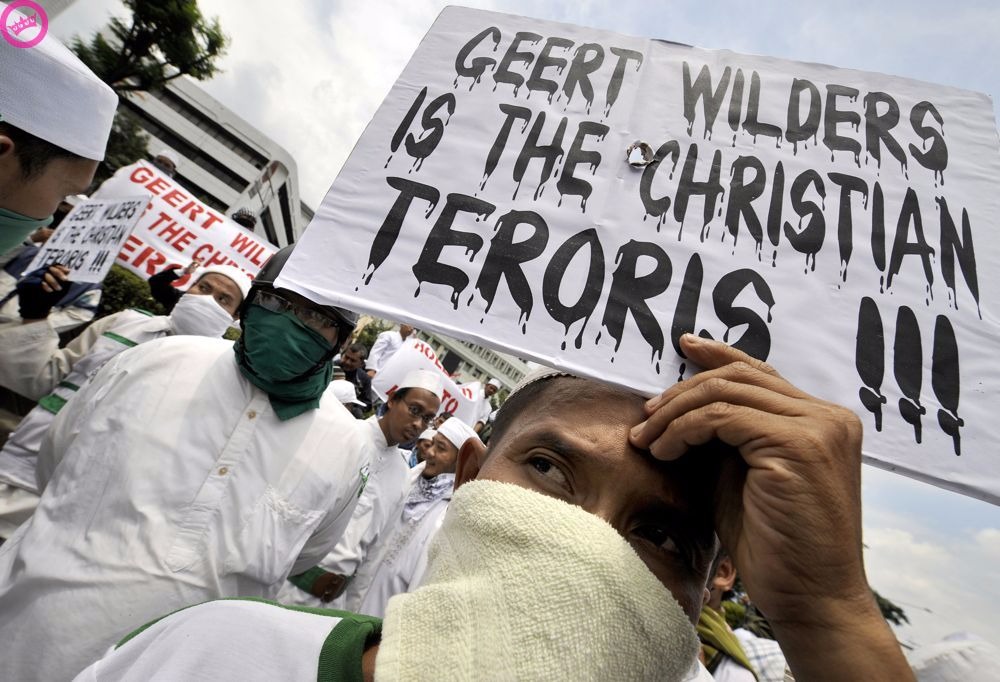
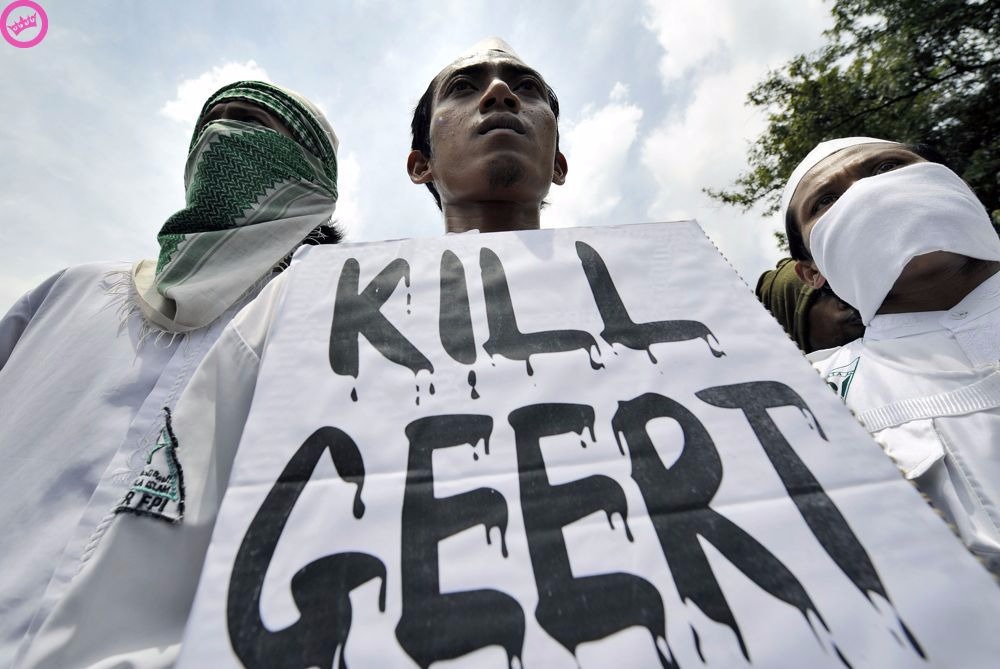
Nomadic thoughts
In the newspaper NRC Hans Beerekamp gave an impetus to an analysis of the relation between old and new media. In Wilders moet nu zijn film los durven laten (Wilders should let go of his film) he thematises internet as a viral medium, essentially distinguishing itself from mass media that communicate information vertically, from one single source to many receivers. “He who wants to convey an explosive message cannot do this under controlled circumstances.” The ‘old’ media operate under strictly controlled circumstances. It is the broadcasting licence-holder who takes the final decision about the transmission of a product. The maker or commissioner of this product doesn’t decide about the release of it. This is the reason why the Dutch broadcasting companies that were offered Fitna demanded a preview. When one is morally responsible and legally liable for what you expose to publicity, this is not done before knowing what you publish. This demand for a preview was consistently and pathetically denounced by Wilders – as if he had something to hide ......
Wilders had to let go of his film. “Only by letting the film lead a life of its own it can freely spread.” This can be done by making Fitna accessible by putting it on YouTube unannounced, by parking it on one of the many digital ‘drop zones’ for large files (such as megaupload or sendfile), or by sharing it with the millions of users of peer-to-peer systems of the internet (for example BitTorrent or Kazaa). Once digital files have been published on one or more strategic internet locations, they spread with speeds that are virtually higher than the reproductive speed of most potent viruses. That’s exactly why one cannot just say that the free traffic of information “can only be guaranteed as long as the message remains under the radar of the old media.” One can say “that an internet hype only really starts coming to life after television and the printing press have adopted it.”
But it should also be said that themes originating on internet increasingly determine the agendas of the old media. The Fitna-fuss didn’t come into being after Nova and other television programmes selected and showed excerpts of it. There’s a good chance that they pluck these excerpts from the internet themselves, that the film has already been watched by millions of people in that case, and that they go on and on about it in news and current affairs programmes. The ‘radar of the old media’ remains important, but loses its steering power. The ‘radar of the new media’ (cyberradar) is an independent force, moderated by swarm intelligence, creating a completely new context of public nature for the ‘old’ media.
In the web forums of young migrants in the Netherlands (such as marokko.nl, maroc.nl and hababam.nl) there were ample discussions about both Wilders’ film and the jihadist threat of terrorism. It is difficult to summarise these discussions in a few words, but the dominant tone was: the jihadists are the ones who ridicule the islam, and it is Geert Wilders who tries to cash in on it in a populist way. The muslim fundamentalists are “as mad as a hatter” and Wilders only needs to glue their dispersed videos in order to spread the image that the islam as such is an intolerate and hatred-inciting religion.
The overwhelming majority of the muslims in the Netherlands do not recognise the caricature of the islam that jihadists spread. They are additionally hurt by the caricature Wilders tries to make of the islam in general and by the prejudices he spreads about Dutch muslims.
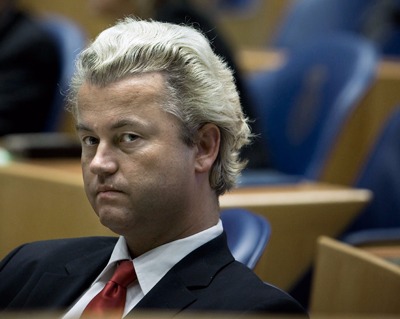 Geert Wilders
|
|---|
Geert Wilders blows up the appropriate criticism of muslim fundamentalism and jihadism to an extremely muscular condemnation of the islam and a gross insult of its believers. And vice versa the appropriate criticism of Wilders’ delusion by jihadists and islamic governments is blown up to a condemnation of ‘the West’ and a blood-drenched martyr lyricism.
In the logic of confrontation and escalation both extremes blow themselves up, by mirroring each other and thus mutually confirming and reproducing each other. As long as this logic dominates the political theatre, there is little political latitude between the ‘fortress of blasphemy’ and the ‘fortress of the true muslims’ for citizens (whether or not believing in ‘something’) who are convinced that a religiously neutral – so secular or if desired religiously blind – state is the best guarantee for both freedom of speech and freedom of religion.
In a democratic constitutional state one doesn’t have to respect for the religious or non-religious beliefs of people, but one does have to respect their right to hold and express different opinions – absurd as they may be. As long as these opinions are not contrary to the non-discrimination regulations. But in such a state no one can be denied the right to publicly criticise the belief, superstition or disbelief of others. Or – just to give an example – to draw a cartoon of this or make a critical film.
Information resources
-
 Hate Groups: Watch Them - Fight Them
Hate Groups: Watch Them - Fight Them
Information sources on hate groups on the internet. - BBC - Why Democracy? Bloody Cartoons
Part I, Part II, Part III, Part IV, Part V, Part VI
Bloody Cartoonsis a documentary showing how and why 12 cartoons in a Danish provincial newspaper can lead to a confrontation between a small country and muslims all over the world. The film was shot in Libanon, Iran, Syria, Quatar, Turkey and Denmark.
- Internet Haganah
- JihadWatch
Informs about the role of theology and ideology of the jihad in the modern world. Corrects misconceptions of the role of the jihad and religion in current national and international conflicts.
- KB: Dossier Terrorisme
- Ministerie van Binnnenlandse zaken [2005]
Vitale infrastructuur is redelijk goed beschermd (Vital infrastructure is fairly well protected)
How well protected is the vital infrastructure in the Netherlands against a fall out due to breakdowns, disasters, sabotage or attacks? According to the Ministry of the Interior the vital structures in our country are reasonably well protected, although additional measures are necessary to protect the various services and facilities even better. This emerges from the first integral analysis of all vital sectors, which Minister Remkes (Ministry of the Interior and Relations of State) sent to the Lower House: Rapport Bescherming Vitale Infrastructuur(Report Protection Vital Infrastructure).
- NRC
- 28.3.08 - Hans Beerekamp: Wilders moet nu zijn film los durven laten (Wilders should dare let his film go now).
-
r Ministerie: Moslim-extremisme/terrorisme
- Site Intelligence Group
Terrorist Publications
- Spits
Jihad-route lonkt voor Wilders(Jihad route has an eye on Wilders)
- Start - National Consortium for the Study of Terrorism and Responses to Terrorism
A centre of excellence of the U.S. Department of Homeland Security based at the University of Maryland.
- Terrorism Research Center
- terrorisme.pagina.nl
Useful links to sources on terrorism.

